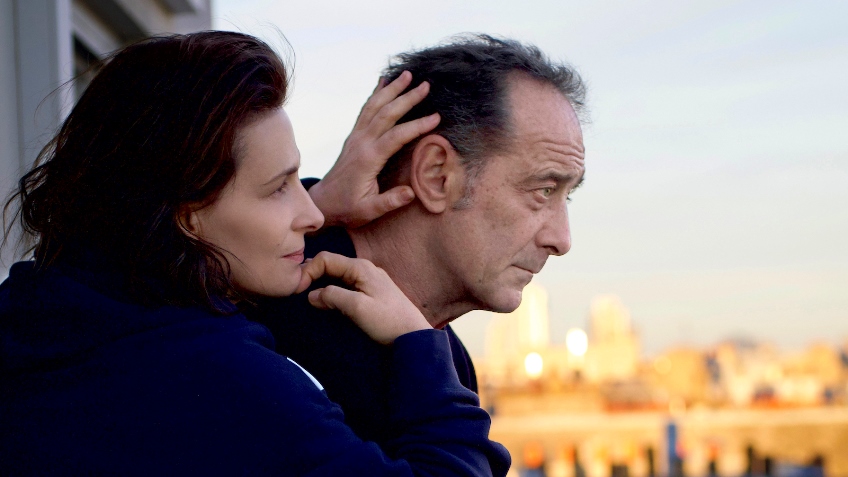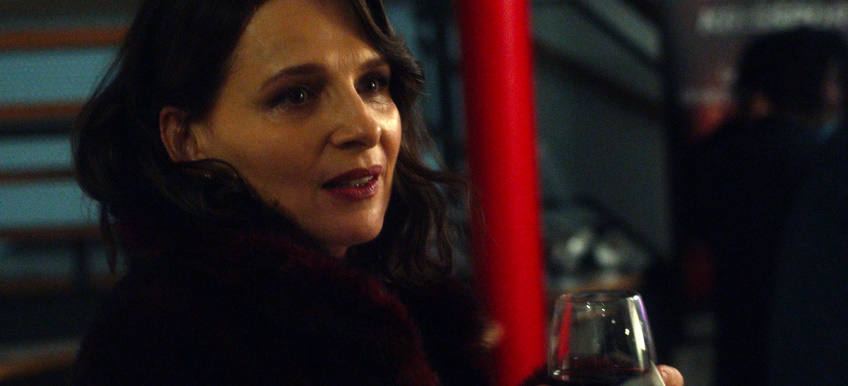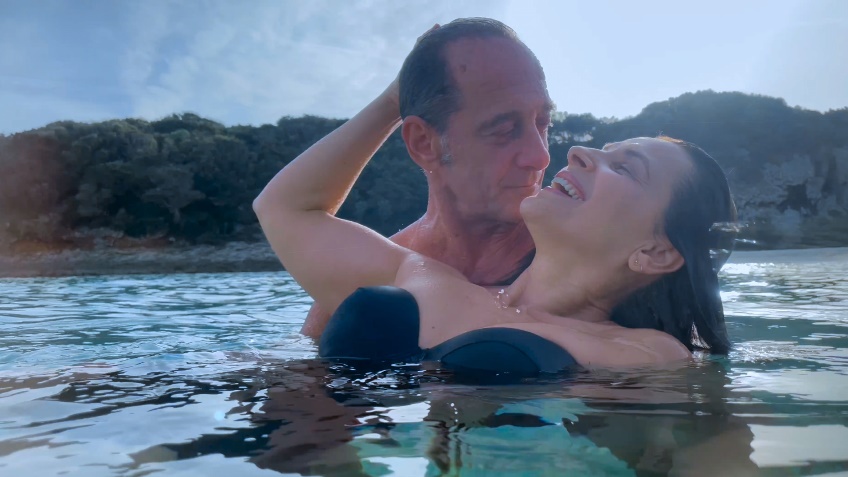Joyce Glasser reviews Both Sides of the Blade (September 9, 2022) Cert 15, 117 mins.
With Juliette Binoche and Vincent Lindon as two complex angles of an impassioned middle-aged, love triangle, you’ll want to see Both Sides of the Blade (in French with English subtitles). Director and co-writer (with Christine Angot, adapting her novel) Claire Denis lights a fire under her characters and sets them free. That the film premiered in New York last March under the title Fire tells us that Denis wanted her lovers to burn through the screen. Well, that’s the idea, and at times it works. But the basics in this neo-realist drama don’t add up.
Sara (Binoche), a beautiful, liberal radio presenter in her fifties, and Jean (Lindon), a sexagenarian former sportsman with, we later find out, a prison record, are on a break at the beach. Judging by the romantic style in which they are filmed – in sun-dripped silence – it could be a honeymoon for a second marriage.
They frolic in the sea like young lovers, kissing as he holds her afloat. While the trip back to their small but chic Parisian flat would jolt the average veterans of nine years of marriage back to reality, Sara and Jean make passionate love that night, as if they can’t get enough of each other.

But all this isn’t enough to prevent Sara’s memory bank exploding when she catches sight of her old flame, François (Grégoire Colin). Coincidental circumstances conspire so that she is not allowed to forget that brief resurgence of desire. That’s because in the small world of local Rugby, François, who is an agent, and Jean, a former star player, know one another. Now Francois is opening a recruitment agency for young players and offers Jean a job as a talent scout.
While Jean does not talk shop, Sara is curious about the business venture with François. This might be out of genuine concern since there is something shady about Jean’s past and something even shadier about François. But Sara’s probing is also a way to hear about her former lover and Jean senses this. While Sara does not want to reveal her dormant feelings for François, Jean is curious, and begins to be jealous.
As for François, he comes across as a charming cad, interested in rekindling the relationship that ended because the couple couldn’t live with one another although they felt they couldn’t live apart. As his character is underwritten, we cannot dig deep to see anything in him that would justify Sara’s risky behaviour.
The plot isn’t the thing. The filmmakers and actors focus on the games we play with ourselves and others to avoid facing the truth about complex emotions. But there are still problems with the script.
Jean has a teenage son from a previous interracial marriage and the boy, Marcus (Issa Perica) lives in the suburb of Vitry with Jean’s mother Nelly, (the great actress, Bulle Olgier, who you can see later this month in a new print of the 50th anniversary reissue of The Discreet Charm of the Bourgeoisie.)
Class differences are subtle but real. Jean goes back to Vitry to do his laundry and go grocery shopping, and while he doesn’t stay long, he feels like he belongs there. Yet he is all but estranged from his son, which frustrates Nelly, who has her hands full with Marcus. He does not eat his toast and shows no interest in school and may be stealing from her. A kind pharmacist in Vitry asks about Marcus’s mother in Martinique and suggests it may do the boy some good to visit her.
Jean appears unresponsive and handles Marcus’s acting out, not with compassion – it was hard for Marcus to grow up with an ex-con for a father – but disapproval. There is more that Sara and Jean as a couple can do for Marcus, which is what is so frustrating about the film.

Sara spends her workdays talking to ethnic minorities (mainly female) about current affairs and culture on her talk radio show. She knows a lot of people and has an interesting job. But she has zero interaction with her stepson. Not once, that I recall, does Sara show an interest in her husband’s child, which is particularly odd as she has no children, and he only has this handsome, troubled young boy. Sara makes no attempt to invite him to visit the station or introduce him to revolutionary women of colour who are making a difference in the world. Marcus never comes to Paris for dinner with the couple. In fact, they don’t seem to have any friends – except Jean.
Equally puzzling is that the filmmakers present François in an unflattering light. The audience is trying to figure out why Sara is willing to risk her marriage for this man who has proven unreliable once.
We suspect it is the sex – always a strong magnet. But in the sex scene with François he’s a brute. You have to wonder why do the filmmakers spend so much time stressing how great the sex is with Jean, if they are trying to create a difficult choice for Sara?
Since Sara is not exactly a warm, generous or interesting woman, it is hard to feel anything for her oscillations and mixed up feelings. Since François is a cad, it’s hard to believe he has any real emotions at all. And Jean is, until the very end, so passive, dull and limited (he shows no interest in Sara’s work or talking about his work or Marcus for instance) you wonder what he and Sara have to talk about all day.
The climax is one of the most devastatingly caustic scenes from a marriage you’ll see this year, superbly acted and directed: but you’ll be relieved with the ending.




